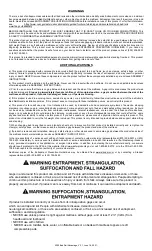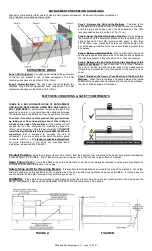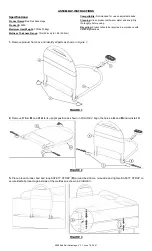
5000 Bed Rail Advantage, V 3.1, June 18, 2021.
ENTRAPMENT PREVENTION GUIDELINES
Stander is committed to inform users of ways to help prevent entrapment. Additional information is located at:
https://stander.com/entrapment-prevention
ENTRAPMENT ZONES
Zone 1: Within the Rail
- Any open space between the perimeters
of the rail can present a risk of head entrapment. The FDA
recommended space is less than 4.75in (12cm).
Zone 2: Under the Rail
- The gap under the rail between the
mattress, may allow for dangerous head entrapment. The FDA
recommended space is less than 4.75in (12cm).
Zone 3:
Between the Rail and the Mattress
- This area is the
space between the inside surface of the bed rail and the mattress,
and if too big it can cause a risk of head entrapment. The FDA
recommended space is less than 4.75in (12cm).
Zone 4:
Under the Rail at the Ends of the Rail
- A gap between
the mattress and the lowermost portion of the rail poses a risk of
neck entrapment. The FDA recommended space is less than
2.375in (6cm). Also, install the bed rail such that the angle at the
end of the bed rail relative to the top of a mattress is greater than
60 degrees.
Zone 5:
Between Split Bed Rails
- When partial length head and
split rails are used on the same side of the bed, the space between
the rails may present a risk of head, neck, or chest entrapment.
Zone 6:
Between the End of the Rail and the Side Edge of the
Head or Foot Board
- A gap of less than 12.5in (32cm) between
the end of the bed rail and the side edge of the headboard or
footboard can present the risk of entrapment of the head, neck, or
chest.
Zone 7:
Between the Head or Foot Board and the End of the
Mattress
- When there is too large of a space between the inside
surface of the headboard or footboard and the end of the mattress,
the risk of head entrapment increases.
MATTRESS CONDITIONS & SAFETY COMPONENTS
THERE IS A MUCH GREATER RISK OF ENTRAPMENT
AND INJURY/DEATH WHEN USING BED RAILS WITH A
SOFT MATTRESS!
A soft mattress increases the risk that a
person’s head, arm, or leg could become entrapped between
the mattress and a rail. Entrapment can cause injury or death.
To ensure it is safe to use this product, test your mattress
by taking your fist and applying about 12lbs (5.4kg) of
weight on the edge of the mattress.
If the mattress is soft
enough that you can compress the mattress by about 2in
(51cm) when applying 12lbs (5.4kg) of weight,
YOU MUST
install the Bed Rail Safety Guard (item #2400/ #2450 sold
separately)
that is designed to minimize the risk of
entrapment. If you are unsure, either install the safety guard
to ensure safety, or visit
stander.com/extra-soft-mattress
for more information.
If you have any questions about
installation, please call 800-506-9901.
Product Position:
Keep the product at least 12.5in (32cm) from the head and foot end plane of the bed to help prevent entrapment
issues as shown in FIGURE A. Top of Bed Rail must be a minimum of 4in (102cm) above top surface of mattress.
Sewn Fabric Cover:
Some Bed Rails come with a sewn fabric cover that must always be installed to helps prevent entrapment.
DO NOT alter the sewn fabric cover in any way.
Safety Strap and Other Securing Means:
It is important that the Bed Rail is secured to the side of the mattress. The safety
strap is looped around the bed frame on the opposite side of the bed, buckled, and tightened as show in FIGURE B. If other means are
used to secure the Bed Rail to the bed, they must always be used.
WARNING
:
If the safety strap provided is not properly secured, the product may move into an unsafe position which increases the
danger of entrapment. See enclosed ASSEMBLY INSTRUCTIONS for proper use of the straps.
FIGURE A
FIGURE B




